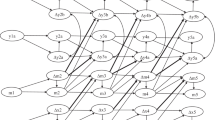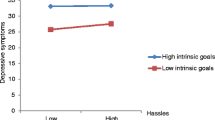Abstract
Prior research on stressful events has largely ignored their potential impact on motivational processes. This study prospectively examined the association of a stressful event with control strivings in the school-to-work transition. Five waves of data on stressful events, control strategies, and potential mediating variables were collected from an adolescent sample in Berlin (N = 420) during the year before high school graduation. The occurrence of a stressful event (death of family member, parent divorce) predicted a decline in general career-related and specific apprenticeship-related control strivings. This association was mediated by a decline in control-related means-ends beliefs. Proximity to the deadline of graduation exacerbated this association for apprenticeship-seeking control strivings, but this effect was buffered by usage of selective secondary control strategies (cognitive strategies to enhance commitment to a goal). Thus, stressful events can exacerbate challenges and require additional means of control striving.


Similar content being viewed by others
Notes
Students also reported whether they experienced a personal illness, the illness of a family member or other important person, personal relationship troubles, relationship troubles between one’s parents, a family move, or another event that the respondent could specify. However, the large proportion of students reporting these events (over 30% in some cases) and anecdotal evidence from during the questionnaire sessions suggested that students interpreted these more ambiguous categories to include minor events (e.g., a cold) as well as major stressors.
Corresponding control-related agency beliefs (beliefs that one has access to particular means) were also assessed for both effort and ability.
References
Abramson, L. Y., Seligman, M. E. P., & Teasdale, J. D. (1978). Learned helplessness in humans: Critique and reformulation. Journal of Abnormal Psychology, 87, 49–74.
Baltes, P. B. (1991). The many faces of human ageing: Toward a psychological culture of old age. Psychological Medicine 21, 837–854.
Baron, R., & Kenny, D. (1986). The moderator-mediator variable distinction in social psychological research: Conceptual, strategic, and statistical considerations. Journal of Personality and Social Psychology, 51, 1173–1182.
Blossfeld, H.-P. (1990). Changes in educational careers in the Federal Republic of Germany. Sociology of Education, 63, 165–177.
Brandtstädter, J. (1998). Action perspectives on human development. Handbook of child psychology: Volume 1: Theoretical models of human development (5th ed.) (pp. 807–863). Hoboken, NJ: John Wiley & Sons.
Brandtstädter, J., & Lerner R. M. (Eds.) (1999). Action and self-development: Theory and research through the life span. Thousand Oaks: Sage.
Carver, C. (2007). Stress, coping, and health. Foundations of health psychology (pp. 117–144) Oxford University Press.
Carver, C. S., & Scheier, M. F. (1998). On the self-regulation of behavior. New York: Cambridge University Press.
Carver, C. S., Scheier, M. F., & Weintraub, J. K. (1989). Assessing coping strategies: A theoretically based approach. Journal of Personality and Social Psychology, 56, 267–283.
Claessens, D. (1968). Rolle und macht [Role and power]. Munich: Juventa Verlag.
Cohen, S., & Wills, T. A. (1985). Stress, social support, and the buffering hypothesis. Psychological Bulletin, 98, 310–357.
Dalgleish, T. (2004). Cognitive approaches to Posttraumatic Stress Disorder: The evolution of multirepresentational theorizing. Psychological Bulletin, 130, 228–260.
Davis, C. G., & McKearney, J. M. (2003). How do people grow from their experience with trauma or loss? Journal of Social and Clinical Psychology, 22, 477–492.
Dietrich, H. (2005). Arbeitslosigkeit von Jugendlichen und Maßnahmen der Arbeitsmarktpolitik in europäischen Staaten [Youth unemployment, labor market policies in European countries]. In J. U. Prager & C. Wieland (Eds.), Von der Schule in die Arbeitswelt : Bildungspfade im europäischen Vergleich (pp. 31–47). Gütersloh: Bertelsmann Stiftung.
Ehlers, A., & Clark, D. M. (2000). A cognitive model of posttraumatic stress disorder. Behaviour Research and Therapy, 38, 319–345.
Epstein, S. (1973). The self-concept revisited: Or a theory of a theory. American Psychologist, 28, 404–416.
Epstein, S. (1990). Cognitive-experiential self-theory. In L. A. Pervin (Ed.), Handbook of personality: Theory and research (pp. 165–192). New York: Guilford Press.
Eysenck, H. J. (1983). Stress, disease, and personality: The inoculation effect. In C. L. Cooper (Ed.), Stress research (pp. 121–146). New York: Wiley.
Folkman, S., Chesney, M., Pollack, L., & Coates, T. (1993). Stress, control, coping, and depressive mood in human immunodeficiency virus-positive and -negative gay men in San Francisco. Journal of Nervous and Mental Disease, 181, 409–416.
Folkman, S., & Moskowitz, J. (2000). Positive affect and the other side of coping. American Psychologist, 55, 647–654.
Goldberger, L., & Breznitz, S. (1993). Handbook of stress: Theoretical and clinical aspects (2nd ed.). New York: Free Press.
Haase, C. M., Heckhausen, J., & Köeller, O. (2007). Investing energy and staying focused: The role of primary and secondary control strategies when striving for a deadline-bound career goal in adolescence. (Manuscript submitted for publication). University of Jena, Germany.
Heckhausen, J. (1991). CAMAQ: Control agency means-ends in adulthood questionnaire. Berlin, Germany: Max-Planck-Institute for Human Development. Unpublished manuscript.
Heckhausen, J. (1999). Developmental regulation in adulthood: Age-normative and sociostructural constraints as adaptive challenges. New York: Cambridge University Press.
Heckhausen, J. (2000). Evolutionary perspectives on human motivation. American Behavioral Scientist, 43, 1015–1029.
Heckhausen, H., & Gollwitzer, P. M. (1987). Thought contents and cognitive functioning in motivational versus volitional states of mind. Motivation and Emotion, 11, 101–120.
Heckhausen, J. & Heckhausen, H. (2008). Motivation and action. New York, NY: Cambridge University Press.
Heckhausen, J., & Schulz, R. (1995). A life-span theory of control. Psychological Review, 102, 284–304.
Heckhausen, J., Schulz, R., & Wrosch, C. (1998). Developmental regulation in adulthood: Optimization in primary and secondary control—A multiscale questionnaire. Technical Report, Max Planck Institute for Human Development and Education, Berlin.
Heckhausen, J., & Tomasik, M. J. (2002). Get an apprenticeship before school is out: How German adolescents adjust vocational aspirations when getting close to a developmental deadline. Journal of Vocational Behavior, 60, 199–219.
Heckhausen, J., Wrosch, C., & Fleeson, W. (2001). Developmental regulation before and after a developmental deadline: The sample case of “biological clock” for child-bearing. Psychology and Aging, 16, 400–413.
Isen, A. (2004). Some perspectives on positive feelings and emotions: Positive affect facilitates thinking and problem solving. Feelings and emotions: The Amsterdam symposium (pp. 263–281). Cambridge: Cambridge University Press.
Isen, A., & Reeve, J. (2005). The influence of positive affect on intrinsic and extrinsic motivation: Facilitating enjoyment of play, responsible work behavior, and self-control. Motivation and Emotion, 29, 297–325.
Janoff-Bulman, R. (1989). Assumptive worlds and the stress of traumatic events: Applications of the schema construct. Social Cognition. Special Issue: Stress, Coping, and Social Cognition, 7, 113–136.
Janoff-Bulman, R. (1992). Shattered assumptions: Towards a new psychology of trauma. New York: Free Press.
Jex, S., Bliese, P., Buzzell, S., & Primeau, J. (2001). The impact of self-efficacy on stressor-strain relations: Coping style as an explanatory mechanism. Journal of Applied Psychology, 86, 401–409.
Kessler, R. C. (2000). Posttraumatic stress disorder: The burden to the individual and to society. Journal of Clinical Psychiatry, 61 S5, 4–12.
Kunzmann, U., & Baltes, P. B. (2003). Wisdom-related knowledge: Affective, motivational, and interpersonal correlates. Personality and Social Psychology Bulletin, 29, 1104–1119.
Labouvie-Vief, G., & Medler, M. (2002). Affect optimization and affect complexity: Modes and styles of regulation in adulthood. Psychology & Aging, 17, 571–587.
Lerner, R. M., & Busch-Rossnagel N. A. (Eds.) (1981). Individuals as active producers of their own development: A life-span perspective. New York: Academic Press.
Magwaza, A. S. (1999). Assumptive world of traumatized South African adults. Journal of Social Psychology, 139, 622–630.
McEwen, B. S., & Stellar, E. (1993). Stress and the individual: Mechanisms leading to disease. Archives of Internal Medicine, 153, 2093–2101.
Morling, B., & Evered, S. (2006). Secondary control reviewed and defined. Psychological Bulletin, 132, 269–296.
Muraven, M., & Baumeister, R. F. (2000). Self-regulation and depletion of limited resources: Does self-control resemble a muscle? Psychological Bulletin, 126, 247–259.
Ozer, E. J., & Weiss, D. S. (2004). Who develops Posttraumatic Stress Disorder? Current Directions in Psychological Science, 13, 169–172.
Phifer, J. F., & Norris, F. H. (1989). Psychological symptoms in older adults following natural disaster: Nature, timing, duration, and course. Journals of Gerontology, 44, S207–CS217.
Poulin, M. (2006). When do assumptions shatter? A prospective investigation of negative events and world assumptions. Unpublished doctoral dissertation, University of California at Irvine.
Poulin, M., & Heckhausen, J. (2006). The life-span theory of control. In R. Schulz, L. Noelker, K. Rockwood, & R. Sprott (Eds.), The encyclopedia of aging (4th ed.) (pp. 657–659). New York: Springer.
Rothbaum, F., Weisz, J. R., & Snyder, S. S. (1982). Changing the world and changing the self: A two-process model of perceived control. Journal of Personality and Social Psychology, 42, 5–37.
Schwartzberg, S. S., & Janoff-Bulman, R. (1991). Grief and the search for meaning: Exploring the assumptive worlds of bereaved college students. Journal of Social & Clinical Psychology, 10, 270–288.
Seligman, M. E. P. (1975). Helplessness: On depression, development, and death. San Francisco: Freeman.
Senatsverwaltung für Gesundheit und Soziales. (1990). Sozialstrukturaltlas Berlin: Eine disaggregierte statistische Sozialraumanalyse [Berlin social structure atlas: A disaggregated statistical analysis of social space]. Berlin, Germany: Author.
Singer, J. D., & Willett, J. B. (2003). Applied longitudinal data analysis: Modeling change and event occurrence. New York, NY, US: Oxford University Press.
Skinner, E. A., & Chapman, M. (1984). Control beliefs in an action perspective. Human Development, 27, 129–133.
Skinner, E. A., Chapman, M., & Baltes, P. B. (1988). Control, means-ends, and agency beliefs: A new conceptualization and its measurement during childhood. Journal of Personality & Social Psychology, 54, 117–133.
Smith, T., Ruiz, J., & Uchino, B. (2000). Vigilance, active coping, and cardiovascular reactivity during social interaction in young men. Health Psychology, 19, 382–392.
Stein, M. B., Walker, J. R., Hazen, A. L., & Forde, D. R. (1997). Full and partial posttraumatic stress disorder: Findings from a community survey. American Journal of Psychiatry, 154, 1114–1119.
Tedeschi, R. G., & Calhoun, L. G. (2004). Posttraumatic growth: Conceptual foundations and empirical evidence. Psychological Inquiry, 15, 1–18.
Tolman, E. C. (1959). Principles of purposive behavior. In S. Koch (Eds.), Psychology: A study of a science (Vol. 2) (pp. 92–157). New York: McGraw-Hill.
Tomich, P. L., & Helgeson, V. S. (2002). Five years later: A cross-sectional comparison of breast cancer survivors with healthy women. Psycho-Oncology, 11, 154–169.
Updegraff, J., Gable, S., & Taylor, S. (2004). What makes experiences satisfying? The interaction of approach-avoidance motivations and emotions in well-being. Journal of Personality and Social Psychology, 86, 496–504.
Watson, D., Clark, L., & Tellegen, A. (1988). Development and validation of brief measures of positive and negative affect: The PANAS scales. Journal of Personality and Social Psychology, 54, 1063–1070.
Wrosch, C., & Heckhausen, J. (1999). Control processes before and after passing a developmental deadline: Activation and deactivation of intimate relationship goals. Journal of Personality and Social Psychology, 77, 415–427.
Wrosch, C., Heckhausen, J., & Lachman, M. E. (2000). Primary and secondary control strategies for managing health and financial stress across adulthood. Psychology and Aging, 15, 387–399.
Wrosch, C., Schulz, R., & Heckhausen, J. (2002). Health stresses and depressive symptomatology in the elderly: The importance of health engagement control strategies. Health Psychology, 21, 340–348.
Acknowledgement
Research reported in this article was supported by the research grant He 3068/3-1 (PIs: Jutta Heckhausen, Olaf Köller) funded by the German Research Foundation (DFG), and by the Max-Planck Award for International Cooperation bestowed to the second author and funded by the German Federal Ministry of Education and Research (BMBF).
The authors would like to thank Susan Charles for her statistical advice and Claudia Haase for her comments on an earlier draft of this paper.
Author information
Authors and Affiliations
Corresponding author
Rights and permissions
About this article
Cite this article
Poulin, M.J., Heckhausen, J. Stressful events compromise control strivings during a major life transition. Motiv Emot 31, 300–311 (2007). https://doi.org/10.1007/s11031-007-9077-6
Received:
Accepted:
Published:
Issue Date:
DOI: https://doi.org/10.1007/s11031-007-9077-6




